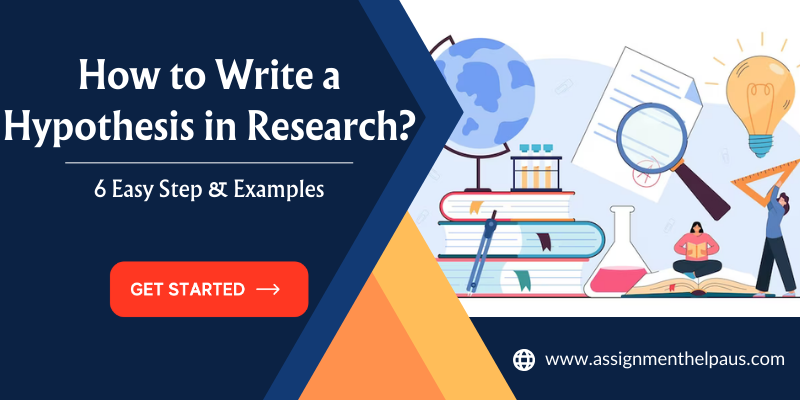What is a Hypothesis?
A hypothesis is typically a tentative statement to propose any possible explanation for any event or phenomenon. A good lab report hypothesis is a testable statement, including any prediction.
In a hypothesis, you need to perform any test of how 2 variables can be related. This is very useful when you are doing any experiment. Here, you need to test the variables. A hypothesis is usually based on the previous observations and making the best inference from it.
Hire the Best Subject Matter Experts Instantly
We provide fast online assignment Writing help to clients.
How to Write the Hypothesis? A Couple of Guidance
A research hypothesis is actually a scientific method involving research in psychology, physics, biology, etc. A scientific hypothesis always represents what any researcher thinks about what will happen in the present experiment. This involves the following functions:
- Making a question
- Carrying out thorough background research
- Making proper hypothesis
- Designing the experiment
- Data collection
- Analyzing the results
- Making conclusions
- Communicating the results
The hypothesis is commonly a prediction but also involves a good guess. Mostly, it begins with a particular question, which is then analyzed via thorough background research. It is at this point in time that the researchers start to develop a good hypothesis. Until you are making any exploratory study, the hypothesis should be explained as you want it to happen.
In a scientific study, you need to explore the facts of the experiment. For example, in a psychology experiment, you need to study the environment that influences a particular person to behave in a definite way.
A hypothesis always predicts what you want to see in your experiment. The ultimate goal of your research is to determine whether your guess is right or wrong. While conducting the experiment, you must explore numerous factors to determine which might contribute to the ultimate outcome.
In numerous cases, the results of the experiment do not support your original hypothesis. While you are writing up these results, suggest another option that can be explored for future studies.
Also Read: Hypothesis Testing in Statistic Assignment Questions and Answers Help
Format of a Hypothesis
In most cases, the researcher may draw the hypotheses from any scientific theory or build on previous research. In other cases, you might look at common beliefs. You might also pose any specific hypothesis, as you suggested.
Typical Elements of a Hypothesis:
Here, it would help if you considered the following questions:
- Is your hypothesis based on any specific research topic?
- Can the hypothesis be tested?
- How does your research experiment hypothesis include the dependent and independent variables?
It would help if you always did good background research before coming up with any specific hypothesis. After completing the liberate review, you need to start thinking about the necessary questions you have in your mind. Here, you need to pay attention to the discussed section in the articles. Here, many authors might suggest necessary questions that need to be explored.
The following are the necessary steps for this:
- Collect the observations regarding any topic as you can
- Evaluate all the observations and look for the possible causes of the issues.
- Create a list of the possible explanations that you want to explore.
- After developing the possible hypothesis, you need to think of possible ways to confirm the hypothesis. This, then, is known as falsifiability.
Hypothesis Fossorial
In any scientific experiment method, falsifiability is a major part of any valid hypothesis. For claiming scientifically, the claim can also be proven false. Sometimes, you might need clarification regarding the idea of falsifiability with any idea of something wrong with the experiment. But this is not the case. Falsifiability means if something were false, it can be demoted as false. For example, any of the pseudoscience hallmarks can be demonstrated as false in any scientific experiment hypothesis.
The operational definitions: A variable factor or element can be changed as well as manipulated in many ways and are observable and measurable. But here, you also define how this variable can be measured and manipulated in your research study hypothesis.
Ex: you might define the variable as “test anxiety” operationally as a result of a self-report thing. These tips of hypothesis are necessary because multiple things can be measured in various ways. One of the very basic principles of any scientific research hypothesis is that the results are replicable. Here, you can clearly see the details of how these variables were measured and manipulated.
Write a Strong Hypothesis in 6 Steps with Examples
The hypothesis is actually a statement that is tested by any scientific research. If you want to examine a relationship between 2 or more variables, you need to make the hypothesis before starting the data collection work or experiment.
Variables in Hypothesis:
Hypothesis truly proposes any relationship between 2 or more variables.
- An independent variable is controlled or changed by the researcher
- A dependent variable is observed or measured by the researcher
If there are any extraneous, control, or confounding variables, ensure that you jot them down all to minimise the chances of their effects on your results.
Writing a hypothesis step-by-step guide:
Step 1: Asking a question: Writing any hypothesis always begins with a research question that you must answer. This question needs to be specific and researchable within your project constraints.
Ex: Does the student who attends lectures more regularly do better in exams?
Step 2: doing preliminary research: Here, your initial answer to the question is to be based on what is already known to your readers regarding the given topic. Here, you need to look for the previous topic and theories. This will help you form educated assumptions about your research findings.
At this stage, you can construct a conceptual framework to ensure that you are embarking on any relevant topic. Doing this will also help you identify which variables are to be studied and your opinion regarding the relationships between them. Here, you can also have to operationalize complicated constructs.
Step 3: Formulate your hypothesis: Aster, having an idea of what you expect from your hypothesis, writes your first answer to the question clearly and briefly within a sentence. Here, you can also brainstorm all the potential hypotheses.
Step 4: refining your hypothesis: You need to ensure that your hypothesis is very stable and specific. There are certain ways to phrase your hypothesis, but all the terms you use need to have unambiguous definitions. Your hypothesis needs to contain the following:
- Relevant variables
- Specific groups to study
- The predicted experiment outcome
Step 5: Phrasing your hypothesis in 3 ways: To identify the variables, you can write down simple predictors before forming. The first part of the sentence states the independent variable, while the second part states the dependent variables. For example, if second-year students attend more lectures from the professors, they will do better in their exams.
In academic research, the hypothesis is commonly phrased in terms of the effects or correlation, where you can state directly the relationship between the already predicted variables. For example, if you are comparing 2 groups, your hypothesis might state the expected difference in finding between them.
Also Read – Paragraph Structure: How to Write Strong Paragraphs?
Step 6: writing a null hypothesis: If your hypothesis research paper involves statistical testing, you must also write a null hypothesis. If it is actually the default position, then the variables have no association. The null hypothesis is written as “HO”. Alternative types of hypotheses are written as H1 or Ha.
HO: The number of lectures attended by the 3rd year students has no effect on their exam results.
H1: The number of lectures attended by the 3rd year students has a sizable effect on their final exam results.
Proofreading and editing: Last but not least, you always need to proofread, thoroughly check, and edit your entire research paper in order to make it flawless before the final submission. The editing part comes after proofreading. Proofreading is for sorting out the mistakes, and editing is for correcting the errors. Thus, in the editing part, you need to correct the errors accordingly.
Conclusion
Thus, writing a perfect research hypothesis is not easy. It would help if you always had the best online research paper writing help service provider. The AssignmentHelpAus.com is always the most preferred choice for you in this regard.
Why AssignmentHelpAus.com?
- We are the most well-known online research hypothesis assignment writing help service provider.
- We provide round-the-world and round-the-clock services
- The most qualified and experienced writers work with us in a team
- We provide a hundred per cent plagiarism, error-free service
Our clients worldwide are very happy and satisfied with our valued services. Thus, join us soon.
Other Related Blogs That Would be Helpful for Your Academic Writing:
♦ How To Write A Good Argumentative Essay?
♦ How To Structure The Essay Paragraphs Using The PEEL Method?
♦ How to Write A College Supplemental Essays?
♦ How to Write a Critical Thinking Reflection Essay for University?
 I’m Harry Thompsom from Australia with a Master’s in Marketing. I have written for Assignmenthelpaus.com for many years on specific topics like dissertations, essays, guidance, plagiarism, formatting, etc., as per my work experience and knowledge. I hope you guys like this post and that it will be helpful for you.
I’m Harry Thompsom from Australia with a Master’s in Marketing. I have written for Assignmenthelpaus.com for many years on specific topics like dissertations, essays, guidance, plagiarism, formatting, etc., as per my work experience and knowledge. I hope you guys like this post and that it will be helpful for you.


